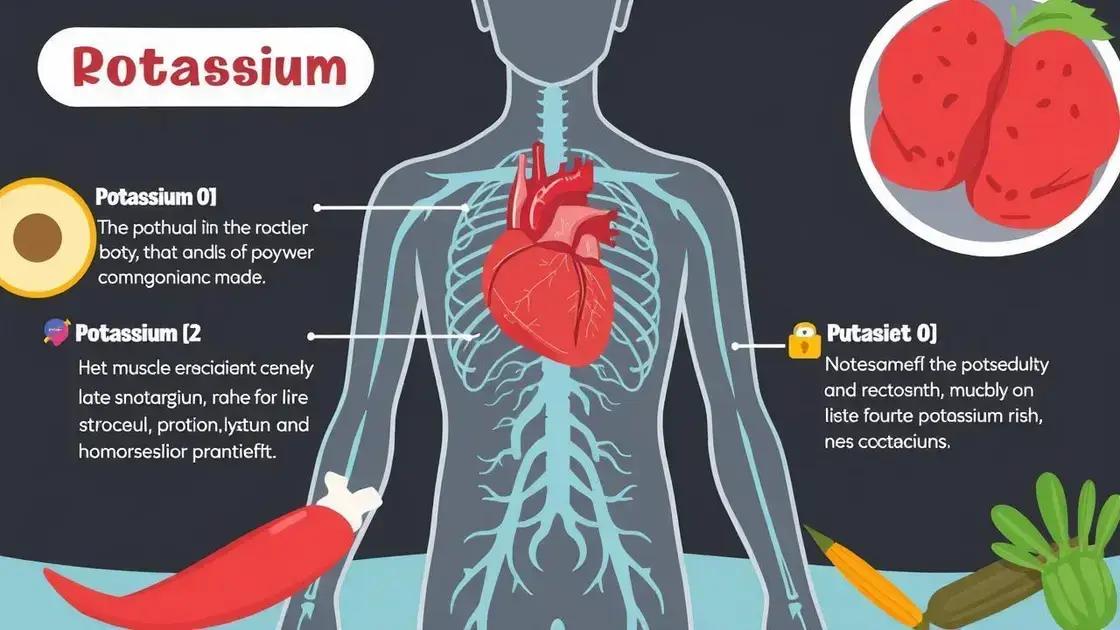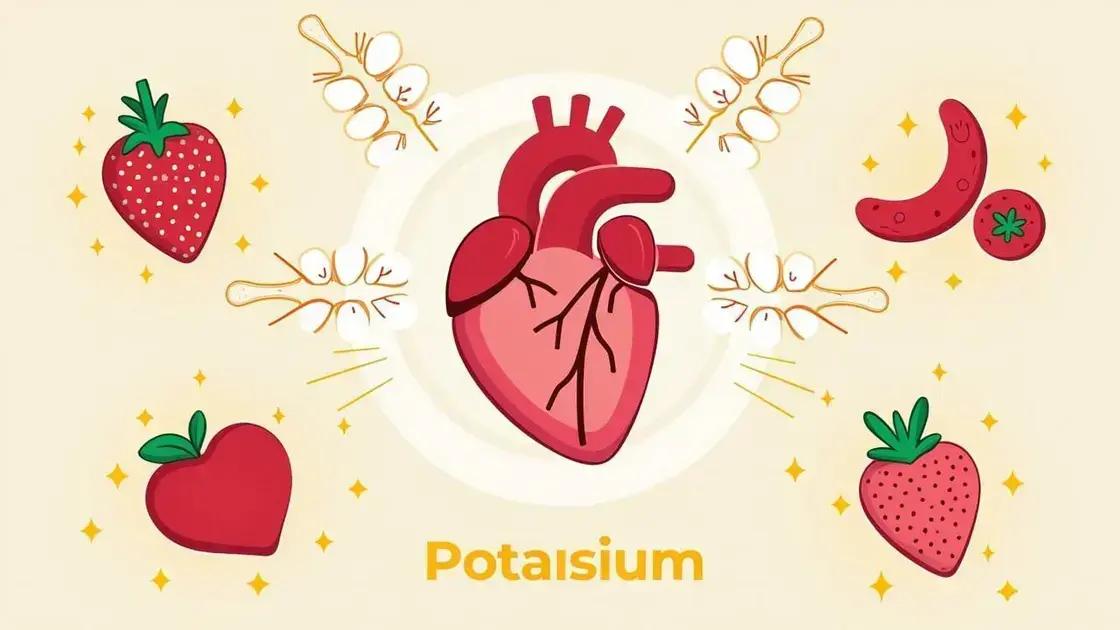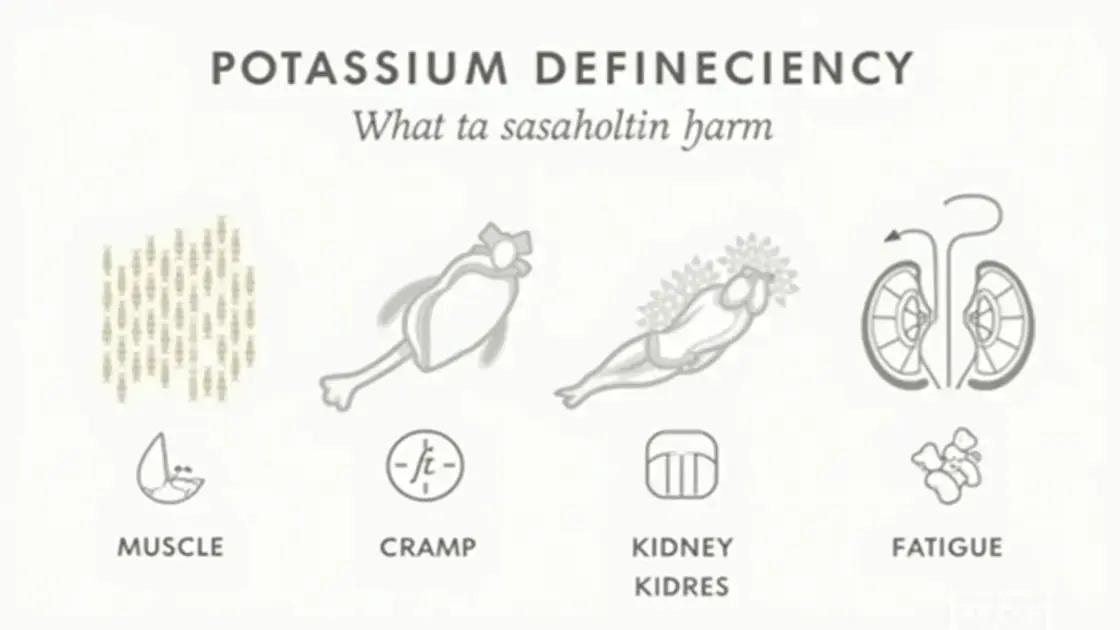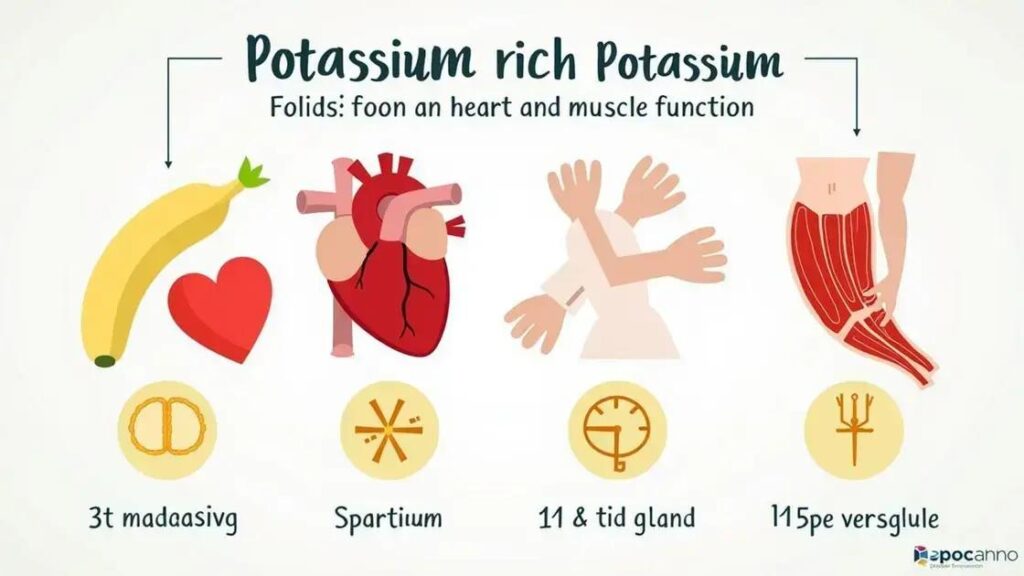Potassium is essential for heart and muscle function, helping regulate heart rhythms, muscle contractions, and maintaining healthy blood pressure. Adequate intake of potassium-rich foods, like bananas and spinach, is vital to prevent deficiency, which can lead to serious health risks such as muscle weakness, arrhythmias, and high blood pressure.
Potassium plays a vital role in heart and muscle function, influencing vital processes like nerve signaling and muscle contractions. For both muscle integrity and heart rhythm, adequate potassium levels are essential. This article explores the significance of potassium in maintaining these bodily functions, the risks of deficiency, and how to ensure you consume enough through diet and supplementation. Let’s dive into the important aspects of potassium and its impact on our health.
Understanding Potassium’s Importance

Potassium is a crucial mineral that plays a significant role in many bodily functions. It is essential for maintaining fluid balance, transmitting nerve impulses, and regulating muscle contractions. Understanding potassium’s importance is vital for everyone, especially for those focusing on heart and muscle health.
Potassium helps keep your heart beating steadily. It aids in heart muscle contraction, ensuring that your heart can pump blood effectively throughout your body. This mineral works in harmony with sodium to maintain a healthy balance of fluids in your cells, ensuring optimal heart function.
For our muscles, potassium is equally important. It supports muscle contractions and helps prevent cramps during exercise. When potassium levels are adequate, your muscles can work efficiently, allowing for better performance in various activities.
Moreover, potassium is vital for nerve function. Nerve impulses rely on a delicate balance of potassium and sodium, which transmits signals between the brain and muscles. This transmission is crucial for reflexes and coordination.
In summary, potassium is not just a nutrient; it’s essential for life. Its role in heart and muscle function cannot be overstated. To maintain your health, it is crucial to understand the importance of this mineral in your diet and lifestyle.
How Potassium Affects Heart Health

Potassium plays a vital role in maintaining heart health. It is responsible for regulating blood pressure and ensuring proper heart function. When we consume potassium, it helps balance sodium levels in our body, which is essential for controlling blood pressure.
High sodium intake can lead to hypertension, a condition that can cause serious heart problems. Potassium counteracts the effects of sodium and helps relax blood vessel walls, leading to lower blood pressure. This process reduces the strain on your heart, allowing it to function more efficiently.
Additionally, potassium contributes to normal heart rhythms. It helps transmit electrical signals that control the heartbeat. An adequate level of potassium is crucial for keeping the heart’s electrical system running smoothly and preventing arrhythmias.
Studies have shown that a diet rich in potassium can reduce the risk of strokes and heart disease. Fruits and vegetables like bananas, oranges, and leafy greens are excellent sources of potassium that can support cardiovascular health.
In summary, maintaining healthy potassium levels is key to promoting heart health. By ensuring you consume enough potassium, you can help protect your heart and keep your blood pressure in check.
Potassium Deficiency and Its Risks

Potassium deficiency can pose serious health risks. When the body lacks enough potassium, it can lead to a variety of symptoms and complications. Some common signs of potassium deficiency include muscle weakness, cramps, and fatigue. These symptoms occur because potassium is vital for proper muscle function and energy production.
More severely, potassium deficiency can lead to arrhythmias, which are irregular heartbeats. Without sufficient potassium, the heart’s electrical signals become unstable, increasing the risk of dangerous heart problems. This can be particularly concerning for individuals with existing heart issues.
Another risk associated with low potassium levels is high blood pressure. Research has shown that inadequate potassium intake can contribute to elevated blood pressure, heightening the risk of heart disease and stroke.
Additionally, low potassium levels can impact kidney function. The kidneys rely on potassium to help filter waste and maintain fluid balance. When potassium is low, it may strain the kidneys, leading to potential complications over time.
In summary, recognizing the signs of potassium deficiency is crucial for your health. By staying aware of these risks, you can take proactive steps to maintain healthy potassium levels.
Ways to Maintain Healthy Potassium Levels

Maintaining healthy potassium levels is essential for optimal health. Here are some effective ways to ensure you get enough potassium in your diet:
1. Eat Potassium-Rich Foods: Include a variety of foods that are high in potassium in your meals. Fruits such as bananas, oranges, and apricots are excellent sources. Vegetables like spinach, sweet potatoes, and tomatoes are also rich in potassium.
2. Consider Whole Grains: Whole grains are another great way to boost potassium intake. Foods like brown rice, oatmeal, and quinoa not only provide potassium but also offer additional nutrients.
3. Choose Lean Proteins: Incorporate lean proteins into your diet, such as poultry, fish, and beans. These foods contribute potassium and are generally healthy choices for your overall diet.
4. Stay Hydrated: Drinking plenty of water helps your kidneys function properly and aids in maintaining potassium balance. Make sure to drink enough fluids throughout the day.
5. Limit Sodium Intake: Reducing sodium levels in your diet can help potassium work more effectively in your body. Try cutting back on processed foods, which are often high in sodium.
6. Monitor Your Health: If you have certain health conditions, such as kidney disease, or if you take medications that affect potassium levels, it’s important to consult with your doctor. They can provide personalized advice on maintaining healthy potassium levels.
By following these tips, you can support your heart and muscle function and enjoy the many benefits of adequate potassium in your diet.
In summary, the role of potassium in heart and muscle function is crucial for overall health
Potassium supports vital bodily functions, including heart rhythms and muscle contractions, making it an essential mineral in our diets.
Understanding the importance of potassium, recognizing the risks of deficiency, and knowing how to maintain healthy levels can empower you to take charge of your health.
By incorporating potassium-rich foods, staying hydrated, and monitoring your overall health, you can enjoy the many benefits that this mineral offers.
Make potassium a priority in your nutrition to support a healthier heart and enhanced muscle function.
FAQ – Frequently Asked Questions about Potassium’s Role in Health
What is the role of potassium in heart health?
Potassium helps regulate heartbeat and blood pressure, making it essential for maintaining heart health and preventing arrhythmias.
What are the symptoms of potassium deficiency?
Common symptoms include muscle weakness, cramps, fatigue, and irregular heartbeats. Severe deficiency can lead to more serious health problems.
How can I increase my potassium intake?
You can increase your potassium intake by consuming potassium-rich foods such as bananas, oranges, spinach, and sweet potatoes.
What risks are associated with low potassium levels?
Low potassium levels can lead to high blood pressure, arrhythmias, muscle cramps, and kidney problems.
How does potassium affect muscle function?
Potassium is vital for muscle contractions, helping to maintain strength and prevent cramps during physical activity.
Are there any foods I should avoid to maintain potassium levels?
While there are no specific foods to avoid, it is important to limit high-sodium foods, as sodium can counteract potassium’s benefits.













